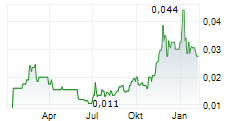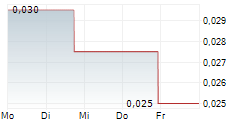
- Late-stage trial in Alzheimer's opens 10 sites in US, with results due in 2025 and 2026
- Appoints US-based Chief Commercial Officer, Andrew Udell
- Xanamem's unique ability to control brain cortisol draws widespread coverage in the Australian media.
SYDNEY, Dec. 9, 2024 /PRNewswire/ -- Actinogen Medical Limited (ASX: ACW) announces that the first participant was randomized and treated Friday in the United States in the XanaMIA phase 2b /3 clinical trial in patients with biomarker-positive mild to moderate Alzheimer's disease (AD).
The trial is designed to select 220 participants with a progressive clinical profile, determined by elevated levels of the blood biomarker pTau181. It measures the effects of a Xanamem® 10 mg daily dose versus placebo over a 36-week treatment period on multiple clinical endpoints of function and cognition.
With the opening of 10 new clinical sites in the US in addition to the existing 15 Australian sites, screening activities and patient enrolment is expected to accelerate to deliver interim results next year and final results in 2026.
The primary endpoint for the XanaMIA AD trial is the Clinical Dementia Rating - Sum of Boxes scale (CDR-SB), a validated combined cognitive and functional measure, recognized by the FDA and used by many companies as an endpoint for regulatory approval. Previously, in an analysis of biomarker-positive patients with mild AD treated with Xanamem, a clinically significant mean benefit vs. placebo of 0.6 points was seen on the CDR-SB endpoint after 12 weeks treatment.
A variety of secondary endpoints will be used for the trial including the Amsterdam Activity of Daily Living scale, which measures the ability to perform everyday tasks and a cognitive test battery comprising seven different digital assessments common to the field.
An interim analysis is planned for Q3 2025 when approximately 100 patients reach 24 weeks of treatment, with final results anticipated in H2 2026.
Dr Steven Gourlay, Actinogen's CEO and MD, said:
"We are pleased to announce the first participant treated in the US in our phase 2b /3 trial in patients with Alzheimer's disease. The ten new sites in the US will bolster the already active recruitment from our Australian sites.
"Based on the encouraging safety and clinical activity seen in multiple prior trials of Xanamem in both AD and major depressive disorder (MDD), we are confident that the trial will confirm clinically and statistically meaningful results."
Chief Commercial Officer appointed
Actinogen recently announced the appointment of US-based Mr Andrew (Andy) Udell as Chief Commercial Officer reporting to CEO Dr Steven Gourlay.
Andy Udell is a commercial leader with demonstrated success taking biotech companies from the clinic through market planning, commercial readiness and full commercial integration and will be a valuable resource for the Company as it continues commercial planning appropriate to late-stage clinical development in Alzheimer's disease and depression.
"We are delighted to announce the appointment of US-based Mr Andrew (Andy) Udell as the Company's inaugural Chief Commercial Officer. We welcome his extensive commercial experience especially in bringing CNS drugs to market as our clinical trial programs advance towards marketing approvals," said Dr Gourlay.
Most recently Mr Udell was President, North America at Calliditas Therapeutics, taking this Swedish biotech through phase 3 trials, market preparation and a successful US product launch. Mr Udell was previously the Vice President Commercial for North America for Neuroderm prior to its acquisition by Mitsubishi Tanabe Pharma. Mr Udell has significant experience working in depression, Parkinson's Disease, and other large central nervous system (CNS) markets.
Mr Udell has a Bachelor of Science degree from Lehigh University and received a Master of Business Administration from the University of Connecticut.
Actinogen's Alzheimer's trial attracts excitement and national media coverage in Australia.
The Xanamem story and its unique mechanism of action in controlling brain cortisol to potentially provide a safe and effective oral treatment for Alzheimer's disease recently gained extensive, nation-wide newspaper, online and television coverage in Australia. As a result, many new clinical trial volunteers have contacted the company.
Dr Gourlay commented, "It's great to see widespread media interest in Xanamem's unique ability to control brain cortisol levels as a once-a-day pill, which sets it apart from other approaches to AD treatment."
Actinogen and Xanamem were featured in national television news stories (7News) and received widespread coverage in national and regional newsprint and online dailies (Brisbane Courier Mail). Development of effective therapies for people suffering from Alzheimer's disease is particularly relevant due to an ageing population, increasing life expectancies and the rising incidence of dementia, which is predicted to overtake heart disease as the biggest cause of death in Australia in the next few years.
Patients or families interested in participating in the XanaMIA phase 2b /3 trial in the US can seek further information by contacting the company here, or by visiting the company's website.
About Actinogen Medical
Actinogen Medical (ACW) is an ASX-listed, biotechnology company developing a novel therapy for neurological and neuropsychiatric diseases associated with dysregulated brain cortisol. There is a strong association between cortisol and detrimental changes in the brain, affecting cognitive function, harm to brain cells and long-term cognitive health.
Cognitive function means how a person understands, remembers and thinks clearly. Cognitive functions include memory, attention, reasoning, awareness and decision-making.
Actinogen is currently developing its lead compound, Xanamem, as a promising new therapy for Alzheimer's Disease and Depression and hopes to study Fragile X Syndrome and other neurological and psychiatric diseases in the future. Reducing cortisol inside brain cells could have a positive impact in these and many other diseases. The cognitive dysfunction, behavioural abnormalities, and neuropsychological burden associated with these conditions is debilitating for patients, and there is a substantial unmet medical need for new and improved treatments.
Current Clinical Trials
The XanaCIDD Phase 2a depression trial was a double-blind, six-week proof-of-concept, placebo-controlled, parallel group design trial in 167 patients with moderate, treatment-resistant depression and a degree of baseline cognitive impairment. Participants were evenly randomized to receive Xanamem 10 mg once daily or placebo, in most cases in addition to their existing antidepressant therapy, and effects on cognition and depression were assessed. Trial results were reported in August 2024 and showed clinically and statistically significant benefits on depression symptoms with positive effects on the MADRS scale (a validated scale of depression symptom measurement) and the PGI-S (a valid patient reported assessment of depression severity).
The XanaMIA Phase 2b Alzheimer's disease trial is a double-blind, 36-week treatment, placebo-controlled, parallel group design trial in 220 patients with mild to moderate AD and progressive disease, determined by clinical criteria and confirmed by an elevated level of the pTau181 protein biomarker in blood. Patients receive Xanamem 10 mg or placebo, once daily, and its ability to slow progression of Alzheimer's disease is assessed with a variety of endpoints. The primary endpoint of the trial is the internationally-recognized CDR-SB (Clinical Dementia Rating scale - Sum of Boxes). The trial is being conducted in Australia and the US. Initial results from an interim analysis of the first 100 participants are anticipated in Q3 2025 and final results H2 2026.
About Xanamem
Xanamem's novel mechanism of action is to control the level of cortisol in the brain through the inhibition of the cortisol synthesis enzyme, 11ß-HSD1, without affecting production of cortisol by the adrenal glands. Xanamem is designed to get into the brain after it is absorbed in the intestines upon swallowing.
Chronically elevated cortisol is associated with progression in Alzheimer's Disease and excess cortisol is known to be toxic to brain cells. Cortisol itself is also associated with depressive symptoms and when targeted via other mechanisms has shown some promise in prior clinical trials. The recent XanaCIDD trial demonstrated clinically and sometimes statistically significant benefits on depressive symptoms.
The Company has studied 11ß-HSD1 inhibition by Xanamem in approximately 400 volunteers and patients in eight clinical trials. Xanamem has a promising safety profile and has demonstrated clinical activity in patients with depression, patients with biomarker-positive Alzheimer's disease and cognitively normal volunteers. High levels of target engagement in the brain with doses as low as 5 mg daily have been demonstrated in a human PET imaging study.
Xanamem is an investigational product and is not approved for use outside of a clinical trial by the FDA or by any global regulatory authority. Xanamem® is a trademark of Actinogen Medical.
Disclaimer
This announcement and attachments may contain certain "forward-looking statements" that are not historical facts; are based on subjective estimates, assumptions and qualifications; and relate to circumstances and events that have not taken place and may not take place. Such forward looking statements should be considered "at-risk statements" - not to be relied upon as they are subject to known and unknown risks, uncertainties and other factors (such as significant business, economic and competitive uncertainties / contingencies and regulatory and clinical development risks, future outcomes and uncertainties) that may lead to actual results being materially different from any forward looking statement or the performance expressed or implied by such forward looking statements. You are cautioned not to place undue reliance on these forward-looking statements that speak only as of the date hereof. Actinogen Medical does not undertake any obligation to revise such statements to reflect events or any change in circumstances arising after the date hereof, or to reflect the occurrence of or non-occurrence of any future events. Past performance is not a reliable indicator of future performance. Actinogen Medical does not make any guarantee, representation or warranty as to the likelihood of achievement or reasonableness of any forward-looking statements and there can be no assurance or guarantee that any forward-looking statements will be realised.
® Xanamem is a registered trademark of Actinogen Medical Limited
SOURCE Actinogen Medical Limited




